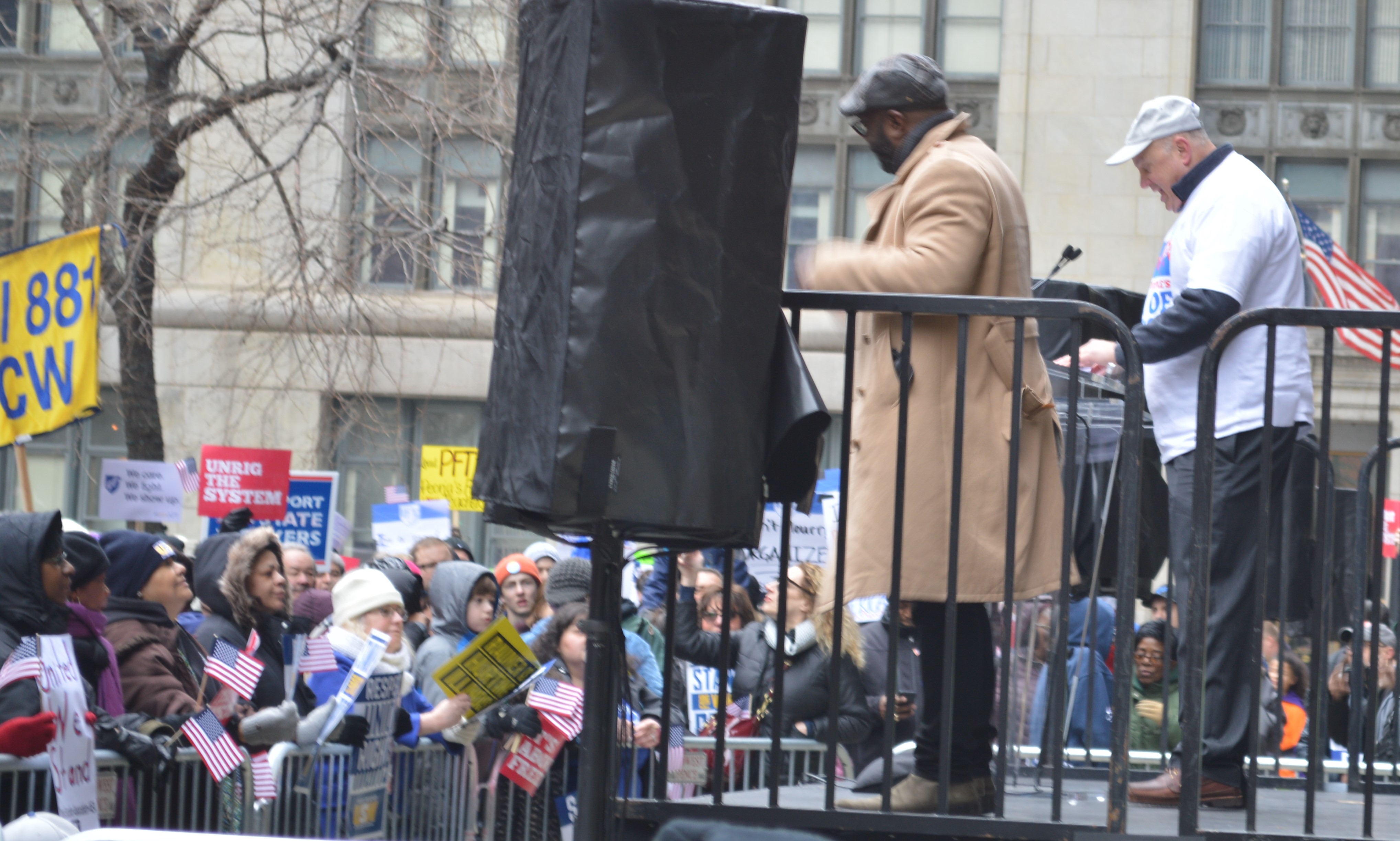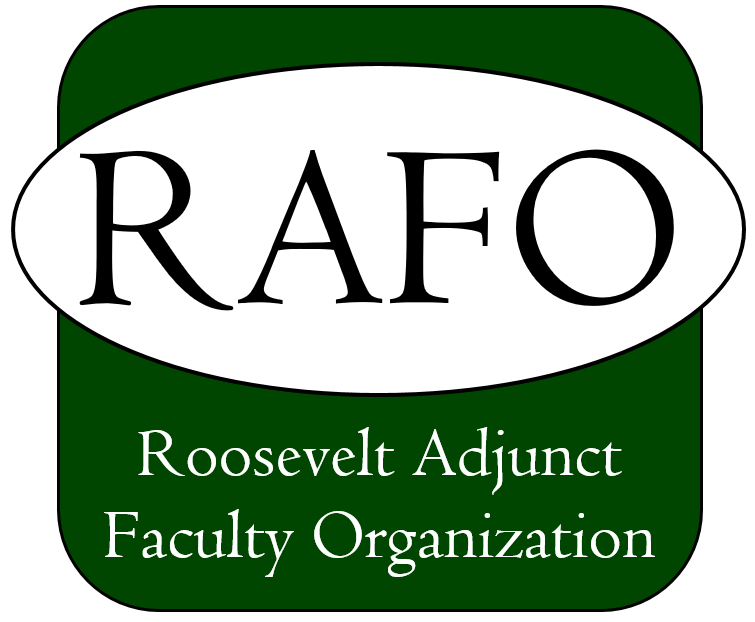
From B.J. Smothers, RAFO Grievance Chair
These are far from the best of times for those who must work for income. I was there to represent teachers, responding to the summons of IEA employees that I knew as close acquaintances. When education has become more important than it has ever been for young  people throughout the world, the U.S. is abdicating its responsibility in the name of private enterprise. From private vs. public schools to teachers’ unions, U.S. citizens are, quite frankly, under siege. It irks me, enough to alter my weekend activities to come out to a union rally in Daley Plaza. Once there, working my way up to the handmade podium, on 28 February 2018, a cold, overcast Chicago afternoon, I quickly became aware of a broader agenda.
people throughout the world, the U.S. is abdicating its responsibility in the name of private enterprise. From private vs. public schools to teachers’ unions, U.S. citizens are, quite frankly, under siege. It irks me, enough to alter my weekend activities to come out to a union rally in Daley Plaza. Once there, working my way up to the handmade podium, on 28 February 2018, a cold, overcast Chicago afternoon, I quickly became aware of a broader agenda.
All unions are under siege. But, these people were standing up for a just society through the right to unionize. This rally was a full workers’ program with representatives from many sectors, including teachers, nurses, and tradespeople. Strong unions help all citizens, but it takes a group together to get it done.

(I spotted Mother Jones in the form of a tall, full-figured balloon. Her “This Is No Pink Party” sign provided some history. The struggle to keep unions alive in the U.S. has a very long history.)
 Some participants came together in small groups, seemingly to visit, as people do at large parties. While the speakers, Paul Pater representing the Illinois Nurses Association (INA), Jeffery Maher, a Galesburg firefighter (AFFI), “Fight for $15” McDonald’s employees Tyree Johnson and Adriana Alvarez, and so on, gave witness to their concerns about the future of their unions and their livelihoods.
Some participants came together in small groups, seemingly to visit, as people do at large parties. While the speakers, Paul Pater representing the Illinois Nurses Association (INA), Jeffery Maher, a Galesburg firefighter (AFFI), “Fight for $15” McDonald’s employees Tyree Johnson and Adriana Alvarez, and so on, gave witness to their concerns about the future of their unions and their livelihoods.
As our democracy continues to be under siege (a friend recently sent me word about Trump’s attack on the Environmental Species Act—ESA), the battle appears daunting because the super wealthy have tasted greater chances to end all rules and regulations and will not be satisfied with mere tax reforms. Yet the energy of that rally is lasting. It reminds me that one has to break from one’s routines in these times of deep trouble. But, besides rallies, just what will it take, short of raising hell, as Mother Jones advocates?
Hello Fellow Adjuncts,
We hope your year is going well. RAFO would like to offer you an opportunity for your continuing professional development. If you are attending a workshop, conference, seminar to learn new skills, or presenting at a conference, RAFO has a mini-grant available to help you defray your expenses.
Download Professional Development Mini-Grant Application (click the download button in the upper right hand corner).
Review the application form and fill out the information requested. We are accepting applications from now until March 16 for the Spring term. All proposals will be reviewed by the professional development committee, and you will be notified if your application is approved and the amount that will be provided.
If you have any questions about the form or the grant itself, please do not hesitate to contact me.
Sincerely,
Ami Hicks, Ed.D.
RAFO, Professional Development
This email address is being protected from spambots. You need JavaScript enabled to view it.
As a part of the RAFO Contract, the Executive Committee meets with President Ali and Provost Lois Becker once a semester to discuss the ongoing progress and changes at the university in regard to the adjunct faculty and our union membership. Here are the main takeaways from our December 18 meeting with the President.
- The “new normal” incoming freshman classes will hover between 350 – 400 students with the greater emphasis on bringing in transfer and graduate students rather than larger freshman classes.
- With an increase in transfer students, more evening and weekend classes will be available for adjunct faculty to teach in the upcoming terms.
- Harper Community College opened a University Center on their campus which will house programs from three universities including Roosevelt. Some of the programs Roosevelt University will be offering at Harper’s University Center include Health Science Administration and Criminal Justice with room to grow other programs in correlation with the Harper College general education requirements. Adjunct faculty members will be asked to teach these courses onsite at Harper. The next steps for RU will be to implement similar programs at College of DuPage, Oakton Community College, and Lake County College.
- Changes to the general education requirements are reducing the ACP courses by two and thus, increasing the electives in other academic areas like philosophy, history, literature, and the social sciences.
- Roosevelt University is completing the final stages of moving programs and offices from the Gage Building so the property can be sold. These profits will be used to lower the overall debt of the university.
If you have additional questions about this summary or would like to participate as a member at large at the next Presidents’ Meeting, please contact me at This email address is being protected from spambots. You need JavaScript enabled to view it..
Jen Wilson, Vice President
RAFO
From Chris Broniak, Membership Chair
A new adjunct asks why the bargaining agreement between Roosevelt University and Roosevelt’s Adjunct Faculty Organization (RAFO) forces adjuncts to join the union. Just to be clear: RAFO doesn't force anyone to do anything they don't want to do. Some adjuncts choose not to join our organization - but they also understand that they will not be eligible to teach more than a second course at Roosevelt if they do not at least complete the paperwork needed by the end of their second term of teaching.
My experience has been that many of the new adjuncts who object to joining our part time faculty union more often than not have a full time non-academic job outside of teaching at Roosevelt. Now when your company respects you and the work you do, you don’t need a union. But adjuncts who don’t have a full time job, who patch together part time teaching at two or three or more area colleges and universities, without the benefits of a full time job, need an organization that “forces” their employer to respect them and what they do. That’s where RAFO comes in.
You most likely won’t notice the respect our bargaining agreement earns its members until you see that Roosevelt’s compensation for an adjunct's first term is a little less than 60% of what RAFO members earn for a course after they’ve completed their first term with the union. The compensation schedule for RAFO adjuncts can be found in Appendix A of RAFO's current bargaining agreement.
The increase in compensation more than offsets the cost of membership dues. If you read closely through the current contract, you’ll see that RAFO has gained other professional rights and opportunities for its members.
If you haven’t already signed up with RAFO, I hope you’ll sign up with us. The benefits of belonging to RAFO far outweigh its costs. Feel free to contact me or any of RAFO’s officers for any further information you may need. We appreciate your interest.
Subcategories
Contracts
RAFO Members:
As lead negotiator for the 2020-2024 contract, I am pleased to announce that your negotiating team and Roosevelt University have come to an agreement. RAFO is extremely pleased with the final outcome and we believe you will be, too. The University was adamant on 0% for the first year, but as an offset for that 0%, we negotiated a signing bonus of $150 for each bargaining unit member that taught either in Spring 2020 or will teach in the upcoming Fall 2020 semester. That then takes us into the final three years of the contract where adjuncts will receive a 2% increase for each of those years.
As I hope you can see from the above, RAFO worked hard to ensure that you are rewarded for the professionalism and integrity all have shown during these unusual and trying times. We are attaching a copy of the final contract for you to review and eventually ratify. The areas that appear in green are changes that were made to the verbiage in the contract that will support RAFO during the upcoming 4 years. Appendix A reflects the 2% increase for each step in the final three years.
A link with the time will be sent next week for all to join this a zoom meeting, where we can answer your questions about the contract.
In closing, we hope you will be as excited as we are regarding the new contract.
In solidarity,
Don Wlodarski and the RAFO team:
Jen Wilson, Joseph Fedorko, Amelia Hicks, Stan Traywick, Mike Pinsoff and Dennis Tucker
Page 27 of 32

